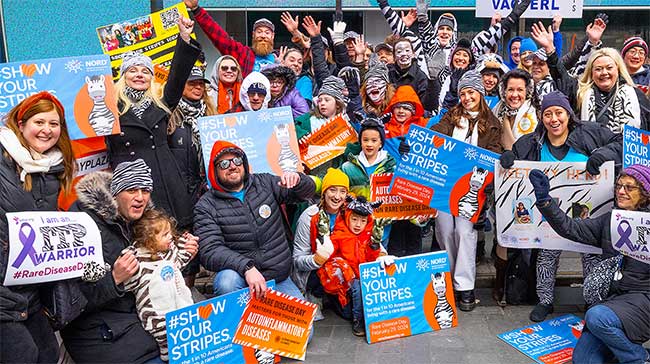I was diagnosed with primary immunodeficiency (PI) when I was four years old. The adversities I have faced with rare disease started even before I received a life-saving diagnosis and are still something I struggle with today. In studying to be a health care professional, it has been a journey to bring to light the adversities patients with rare diseases face, as well as making health professionals aware of the zebra and its significance, whether that be for a diagnosis or in consideration to medication therapy.
Rare Disease Day is important to me because it is a celebration of my stripes as a rare disease patient and advocate. I am proud to have been through the battles I have faced with having a rare disease. I am also proud that I can hopefully one day help my patients with the battles they may face.
One of the challenges I have continuously faced as a rare disease patient, especially this year, is that I rarely ever have a say regarding my medication therapy. I receive a therapy called immunoglobulin, which is sourced from plasma from healthy donors. Immunoglobulin is the only therapy those with PI can get that will keep us healthy and alive. Many others with a rare disease and I rarely get the choice of another therapy, which brings many adversities. First, the price of immunoglobulin is incredibly expensive and puts a lot of stress on my parents and myself. I worry about the day I will have to provide insurance for myself and the potential challenges that may come with receiving my medication.
Second, those who rely on plasma-based therapies worry about access to their medications and possible shortages. Due to COVID-19, there has been a decrease in plasma donors. This is worrisome for patients that rely on plasma therapies to keep them healthy and alive, as it can take up to 1,000 donations to treat a patient with a rare disease.
Finally, there is little support from health care professionals regarding the mental aspects of having a rare disease. This year, I was faced with having to receive my immunoglobulin therapy subcutaneously versus intravenously. This was incredibly hard for me because I loved receiving intravenous treatments and had been doing them this way since I was four years old. This change became necessary when my portacath had to be removed. My doctor felt that there was no other option, as my veins were not strong enough to be on life-long intravenous therapy and I had a high risk of developing a blood clot. The subcutaneous infusions have been incredibly painful, time-consuming and do not provide me with the same energy that intravenous infusions did. When I sought out help from my physicians, I received no support. It was a problem that was brushed off by the idea that maybe one day it would get better, and that I shouldn’t complain because the treatment works well for others that receive it.
Health equity represents the social, economic and environmental conditions that affect a person’s health. Those with rare diseases are significantly impacted by heath equity in several ways such as diagnosis, access to treatment and appropriate patient care. Rare disease patients must fight for the proper diagnosis because most doctors refuse to look for the zebra. Patients with rare diseases worry about having access to expensive medications. Many patients may have to travel exceptionally long distances to find a health care provider that specializes in their disease type. Health care providers can discourage rare disease patients and provide little support or willingness to help, leaving patients feeling as if their battle with their disease is either insignificant or defines them. With increased advocacy and awareness, I hope that these struggles lessen.
I am my school’s pharmacy pediatrics club president (Pharm.peDs). I was motivated to be Pharm.peDs president because it recognizes both the rare and pediatric communities. This is due to the strong link between pediatric and rare disease patients, as 50% of those affected by rare diseases are children. For Rare Disease Day 2021, the club is participating in many events to bring awareness to rare diseases with the help of NORD’s Rare Action Network Arizona volunteer state ambassador, Dr. Melinda Burnworth. I am excited to use my experience as a pediatric patient with a rare disease to bring awareness to both the school and rare community of zebras of the medical world, as well as the battles that they face.




